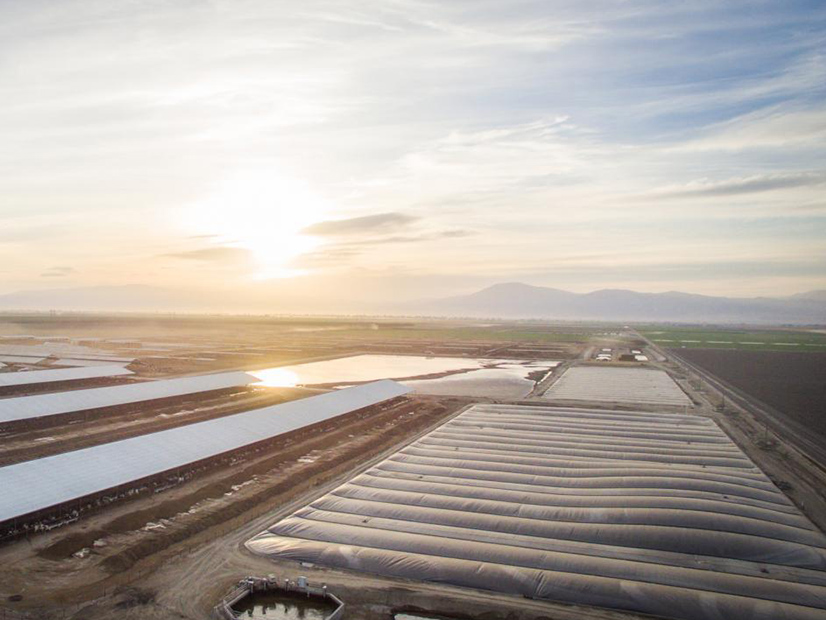A petition filed with the California Air Resources Board last week challenges the agency’s inclusion of dairy-manure biomethane as a fuel potentially eligible for credits under the agency’s low-carbon fuel standard.
The petition alleges that the standard’s credit system doesn’t account for emissions throughout the full life cycle of the biomethane, which is generated from the anaerobic digestion of dairy cow and swine manure.
As a result, the credit system overstates the emission reduction benefits of the biomethane, according to the petition, which refers to the biomethane as “factory farm gas.”
In addition, the petition says that the credit system encourages increased manure production and processing. This allegedly has disproportionate environmental and health impacts on low-income communities and communities of color, particularly in the San Joaquin Valley.
The petition was filed on Oct. 27 and signed by representatives of six groups: Public Justice, Food & Water Watch, the Animal Legal Defense Fund, the Association of Irritated Residents, Leadership Counsel for Justice & Accountability, and the Vermont Law School Environmental Justice Clinic.
The petition asks CARB for rulemaking to amend its low-carbon fuel standard (LCFS) to exclude all fuels derived from factory farm gas; or to modify LCFS to account for emissions over the entire lifecycle of the dairy-manure biomethane.
Board Meeting Debate
The petition was filed the day before the CARB board met to review the agency’s Mobile Source Strategy, which is intended to take an integrated approach to reducing emissions from mobile sources ranging from forklifts to cars, trucks and locomotives.
And the petition was the focus of several public comments during the board meeting.
Shayda Azamian, a policy coordinator with Leadership Counsel for Justice and Accountability, said the group has been urging agencies across California to stop permitting dairy digesters, the equipment used to anaerobically digest manure to produce biomethane.
“Dairy digesters do not lead to real emissions reductions in greenhouse gases, short-lived climate pollutants or toxic pollution,” Azamian said. “Dairy digesters are in fact increasing local pollution by incentivizing increased herd sizes by the thousands.”
But others described dairy digesters as a cost-effective strategy for helping the state meet its climate goals.
Michael Boccadoro, executive director of Dairy Cares, a dairy industry coalition, said the California Department of Food and Agriculture dairy digester program has received 2.1% of funds from the state’s climate investment portfolio. But the program accounts for 29% of emission reductions achieved by all investments, he said.
“Dairy digesters are the most cost-effective and successful climate investment being made by the state of California,” Boccadoro said.
The petition is asking CARB “to abandon market-based approaches that are clearly working,” he said. Without those strategies, Boccadoro said, dairy production will shift to other places in the U.S. and the world, and global livestock methane emissions will increase.
Julia Levin, executive director of the Bioenergy Association of California, said the petition’s request to exclude dairy methane from the LCFS would “fly in the face of the science,” which points to the urgency of curbing methane emissions to address climate change.
In addition, Levin said, Senate Bill 1383 includes incentives for reducing dairy biomethane, including incentives under LCFS specifically. The 2016 bill addresses emissions of methane and other short-lived climate pollutants.
“Granting petitioners’ application would contradict the plain language of SB 1383 as well as the science, and the petition should be rejected,” Levin said.
Selling Fuel Credits
The LCFS is a regulation aimed at reducing the carbon intensity of transportation fuel used in California, while providing a greater variety of low-carbon and renewable alternatives. The carbon intensity of a fuel is compared to a benchmark set for each year.
Fuels whose carbon intensity falls under the benchmark generate credits. For those that exceed the carbon-intensity benchmark, credits must be purchased to comply with the regulation. The benchmark will decrease each year through 2030.
At issue in the petition is how the carbon intensity of dairy-manure biomethane is calculated. For example, according to the petition, LCFS does not require an analysis of factory farm gas emissions to include emissions from digestate, the material that’s left over after the anaerobic digestion of manure.
Composting the digestate or spreading it over the land produces nitrous oxide, the petition claims, and storing it in open-air lagoons may release methane.
In addition, the petition said that factory farms have been allowed to “double dip” by using public funds to help pay for manure digesters and then also receiving money from selling LCFS credits.
Groups filing the petition said that CARB’s Mobile Source Strategy “counts on increased production of factory farm gas without consideration of its air, water, and climate impacts, especially in lower income communities and communities of color.”
Following the CARB board’s review of the Mobile Source Strategy last week, the strategy will be submitted to the legislature as required by state law.




